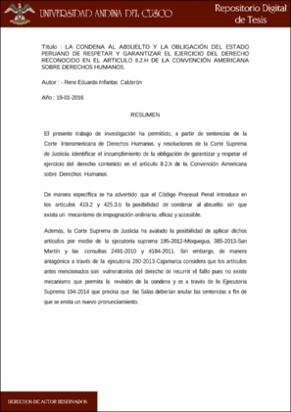| dc.contributor.advisor | Velásquez Delgado, Percy | |
| dc.contributor.author | Infantas Calderón, René Eduardo | |
| dc.date.accessioned | 2016-06-30T14:37:52Z | |
| dc.date.available | 2016-06-30T14:37:52Z | |
| dc.date.issued | 2016-01-19 | |
| dc.identifier.uri | https://hdl.handle.net/20.500.12557/205 | |
| dc.description.abstract | El presente trabajo de investigación ha permitido, a partir de sentencias de la Corte Interamericana de Derechos Humanos, y resoluciones de la Corte Suprema de Justicia identificar el incumplimiento de la obligación de garantizar y respetar el ejercicio del derecho contenido en el artículo 8.2.h de la Convención Americana sobre Derechos Humanos.
De manera específica se ha advertido que el Código Procesal Penal introduce en los artículos 419.2 y 425.3.b la posibilidad de condenar al absuelto sin que exista un mecanismo de impugnación ordinario, eficaz y accesible.
Además, la Corte Suprema de Justicia ha avalado la posibilidad de aplicar dichos artículos por medio de la ejecutoria suprema 195-2012-Moquegua, 385-2013-San Martín y las consultas 2491-2010 y 4184-2011. Sin embargo, de manera antagónica a través de la ejecutoria 280-2013-Cajamarca considera que los artículos antes mencionados son vulneratorios del derecho de recurrir el fallo pues no existe mecanismo que permita la revisión de la condena y es a través de la Ejecutoria Suprema 194-2014 que precisa que las Salas deberían anular las sentencias a fin de que se emita un nuevo pronunciamiento. | es_PE |
| dc.description.abstract | This research has permitted to identify the infrigement of the obligation to guarantee
and respect the exercise of the right contained in article 8.2 h of the American
Convention on Human Rights, This identification has come from the judgments of
the Interamerican Court of Human Rights, and the resolutions of the Supreme Court
of Justice.
More specifically, it has been identified that the Criminal Procedural Code introduces
in articles 419.2 and 425.b the option to sentence the acquitted without any efficient
and accesible means of ordinary appeals.
Furthermore, the Supreme Court of Justice has supported the possibility to
implement such articles through the Supreme Executory 195-2012-Moquegua, 385-
2013-San Martin and the inquiries 2491-2010 and 4184-2011. However, in a
contentious way, the executory 280-2013-Cajamarca considers that the articles
aforementioned are infringing the right to resort the judgment because there is no
mechanism that will enable the review of the sentence, and it is through the final
sentence 194-2014 which says that the Tribunals should annul the sentences in order
to trigger the issuance of new pronouncements. | en_US |
| dc.description.uri | Tesis | es_PE |
| dc.format | application/pdf | es_PE |
| dc.language.iso | spa | es_PE |
| dc.publisher | Universidad Andina del Cusco | es_PE |
| dc.rights | info:eu-repo/semantics/restrictedAccess | es_PE |
| dc.source | Universidad Andina del Cusco | es_PE |
| dc.source | Repositorio Institucional - UAC | es_PE |
| dc.subject | Condena | es_PE |
| dc.subject | Sentenciados | es_PE |
| dc.subject | Absolución | es_PE |
| dc.title | La condena al absuelto y la obligación del estado peruano de respetar y garantizar el ejercicio del derecho reconocido en el artículo 8.2.H de la Convención Americana sobre Derechos Humanos. | es_PE |
| dc.type | info:eu-repo/semantics/bachelorThesis | es_PE |
| thesis.degree.name | Abogado | es_PE |
| thesis.degree.grantor | Universidad Andina del Cusco. Facultad de Derecho y Ciencia Política | es_PE |
| thesis.degree.level | Título Profesional | es_PE |
| thesis.degree.discipline | Derecho | es_PE |

